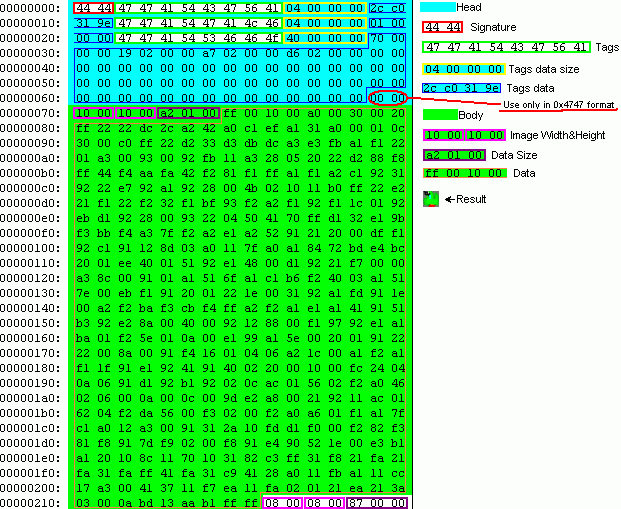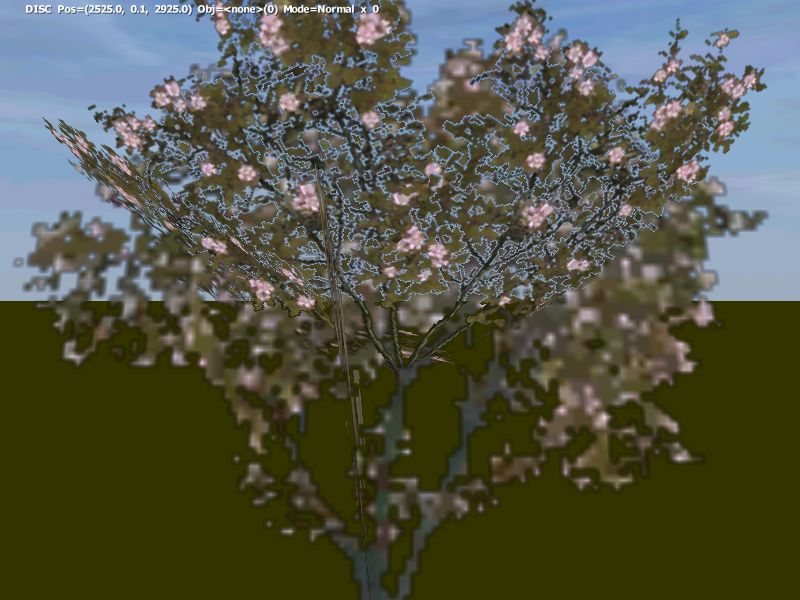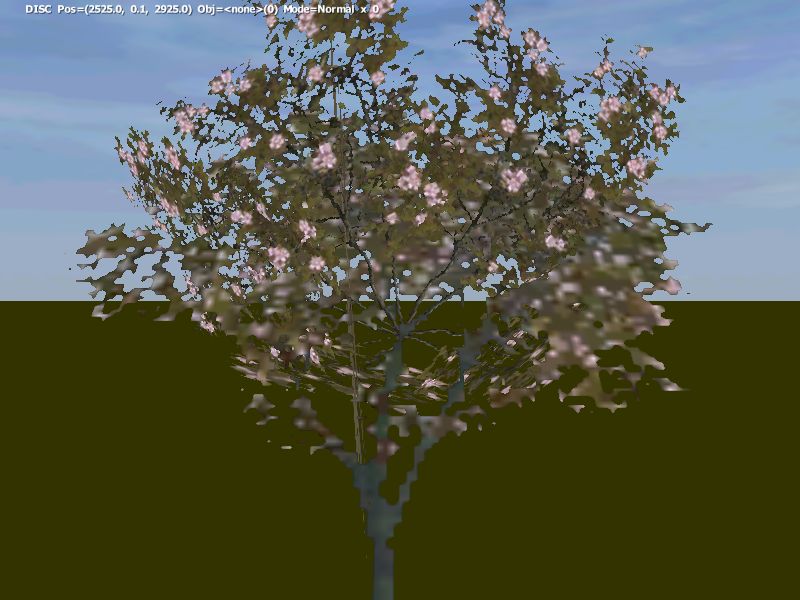PAA File Format: Difference between revisions
m (→Main Format) |
m (→Main Format) |
||
| Line 24: | Line 24: | ||
}; | }; | ||
Every PAA file starts with a TypeOfPaa | Every PAA file starts with a '''TypeOfPaa''' | ||
ushort TypeOfPaa; // type of texture, known values are | ushort TypeOfPaa; // type of texture, known values are | ||
| Line 30: | Line 30: | ||
// 0x1555 Uncompressed RGBA 5:5:5:1 texture | // 0x1555 Uncompressed RGBA 5:5:5:1 texture | ||
// 0x4444 Uncompressed RGBA 4:4:4:4 texture | // 0x4444 Uncompressed RGBA 4:4:4:4 texture | ||
// 0x8080 Uncompressed Luminosity/Alpha map. Actual color of texture is derived from AVGCTAGG tag? | // 0x8080 Uncompressed Luminosity/Alpha map. Actual color of texture is derived from AVGCTAGG tag? | ||
// 0xFF05 XBox version only. Most likely DXT5 compressed texture | // 0xFF05 XBox version only. Most likely DXT5 compressed texture | ||
// 0x4747 Uncompressed Index Palette texture '''SPECIAL CASE''' see notes | |||
followed by | |||
followed by '''optional''' header tags | |||
struct PAA_Tag { | struct PAA_Tag { | ||
| Line 43: | Line 43: | ||
} | } | ||
followed | followed by an EndofTags ushort of zero, indicating, no more tags !! | ||
==HexDump== | |||
[[Image:Paacformat.gif]] | [[Image:Paacformat.gif]] | ||
Revision as of 14:27, 24 November 2006
PAA texture file structure
Introduction
Of the many image file formats 'out there', such as jpeg, such as gif. BI choose to use a specially developed file format (paa) as the base texture file for all engine types.
The reason for this is the raw data within the file can be passed directly to Miscrosft's Direct X as a DCT1 picture without further massaging.
While all engines except Elite also support JPG files, PAA files can result in much better performance.
Main Format
Overall structure of a Paa file is
struct overall
{
ushort TypeOfPaa;
struct HeaderTags {...}; // OPTIONAL
ushort EndofTags; // always zero
struct MipMap_DataBlocks{....};
byte EndOfMaps[6]; // always zero
};
Every PAA file starts with a TypeOfPaa
ushort TypeOfPaa; // type of texture, known values are
// 0xFF01 DXT1 compressed texture (may have 1 bit alpha map, check MSDN documentation for details)
// 0x1555 Uncompressed RGBA 5:5:5:1 texture
// 0x4444 Uncompressed RGBA 4:4:4:4 texture
// 0x8080 Uncompressed Luminosity/Alpha map. Actual color of texture is derived from AVGCTAGG tag?
// 0xFF05 XBox version only. Most likely DXT5 compressed texture
// 0x4747 Uncompressed Index Palette texture SPECIAL CASE see notes
followed by optional header tags
struct PAA_Tag {
byte name[8]; // name of tag is actually reversed when written in file,
// so OFFSTAGG would be written as GGATSFFO. See below for known tags.
ULONG tag_size; // size of this tag
byte data[tag_size]; // size * bytes of actual data
}
followed by an EndofTags ushort of zero, indicating, no more tags !!
HexDump
Known header tags
There are several knowns header tags.
OFFSTAGG
MipMap data is presented in 'blocks'. One or more 'blocks' exist in a paa file.
This is a pointless and redundant tag that declares where each of these blocks are in the file, relative to start of file.
The location of each block is already known, relative to the size of the previous block (if any). So, although almost always present in paa files, it's use, is redundant.
This tag always contains 16 ULONG offsets. Each one is a hard offset to actual mipmap data relative to start of file.
Not all entries are used (obvuously) since most paa files contain less than 16 mipmaps. Unused offsets contain the value 0x00000000.
AVGCTAGG
This tag contains average color of texture, probably used in rendering 8:8 luminosity/alpha textures.
FLAGTAGG
Marks if texture contains transparency. Value 1 means basic transparency, 2 means alpha channel is not interpolated. This flag should be always present in LOD textures with 1-bit alpha with value of 2 or there will be "ghost outlines" on LOD textures when viewed from distance. Note that this flag must be present in texture file when binarizing model, because Binarize stores information about how to render textures in actual P3D file.
If format not 0x4747 then end of header tag data is marked by UWORD 0x0000, else this is a `size of palette` and next block it`s a palette(sizeof = `size of palette` * 2)
ArmA / Elite
Purpose of these tags are not yet known.
MAXCTAGG
Contains color of brightest pixel in texture?
SWIZTAGG
Found in detail map textures. Seems to always contain 4 bytes of data.
Mipmap data
After end-of-header marker, actual mipmap data follows. Tag OFFSTAGG (which is, obviously, a mandatatory tag) contains (up to) 16 offsets. Each offset points to the following struct type (relative to start of the file).
struct Mipmap_Data {
UWORD width; // width of this mipmap
UWORD height; // height of this mipmap
UCHAR size[3]; // size of compressed texture data. this is 24-bit unsigned integer.
UCHAR data[size]; // actual texture data
};
Note that the size reflects the size of data in the file not the actual size if that data if is compressed.
The size of output data for Dct1 format is (width*height / 2)
Size of output data for Dct5 format is (width*height)
Texture types 0x4444,0x4747,0x1555 and 0x8080 are always stored in compressed format. See Pbo_File_Format#Data Compression for details. DXT1 textures are stored "as is".
After last mipmap, there are six (6) bytes set to 0x00 to mark end of texture data.
Alpha channel interpolation
These two images visualize difference between alpha channel interpolation (FLAGTAGG header tag value).
FLAGTAGG = 1, interpolated alpha channel (default behaviour)
FLAGTAGG = 2, alpha channel interpolation disabled
Bibliography
Feersum's original posting on BIS forums: Paa/pac texture format documentation MSDN documentation on DXT1 textures: DirectX: Opaque and 1-Bit Alpha Textures


